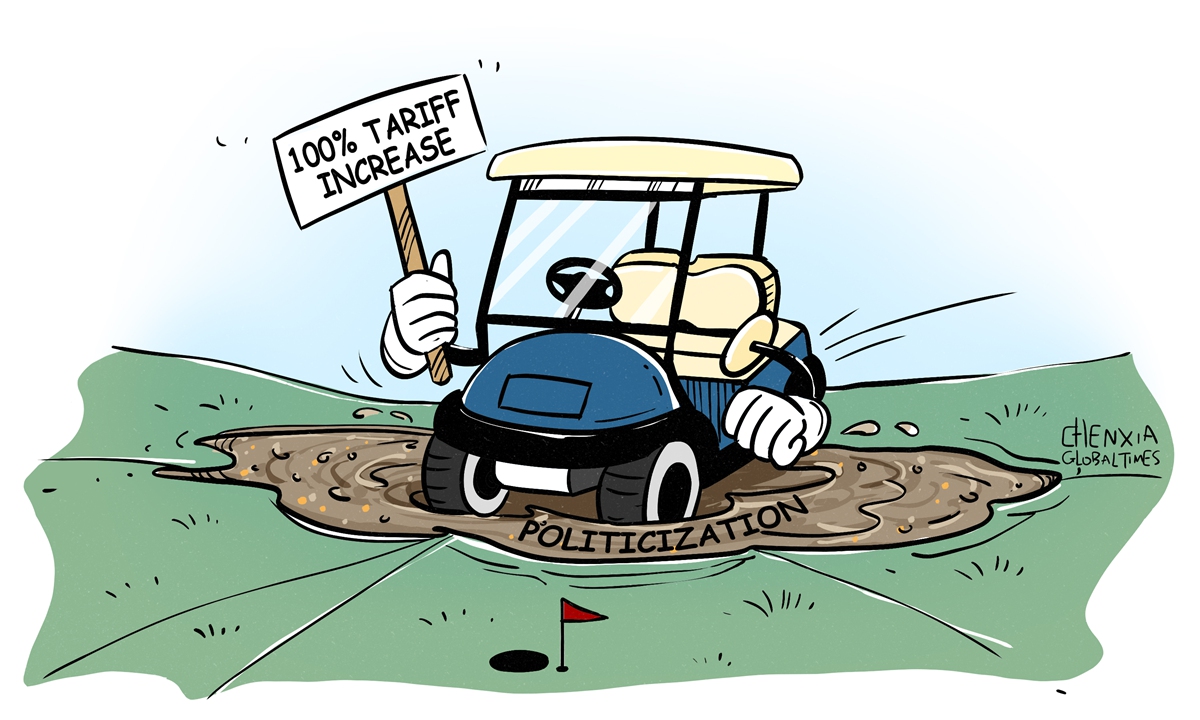
Illustration: Chen Xia/GT
The two largest golf cart producers in the US have appealed to Washington to impose 100 percent tariffs on Chinese-made golf carts, shortly after the Biden administration announced that it will raise the import tariffs on Chinese electric vehicles from 25 to 100 percent in May, Bloomberg reported on Saturday.
These excessive demands made by US golf cart producers highlight a troubling reality: The US, initiating a harmful trend of tariffs and protectionism worldwide, is now heavily reliant on these lose-lose tactics. It appears that the US has lost sight of where to draw the line when it comes to tariffs.
Club Car LLC and Textron Specialized Vehicles asked the Biden administration last week to impose a 100 percent tariff on golf carts and other low-speed, often battery-powered personal vehicles made in China. "Chinese import volumes have rapidly increased... We had to take action," Club Car President and CEO Mark Wagner said in an emailed statement Friday, according to Bloomberg.
Golf carts are a niche market, and the push by American golf cart manufacturers for the government to impose tariffs on China reflects a surging protectionist tendency among some US businesses. The first reaction of businesses to the increase in sales of Chinese products has become to demand that the government raise tariffs to block competitors. This trend is undeniably regretful.
It should be pointed out that the wrong reaction to normal market competition by these American companies is also a result of the unfriendly signals toward China in economic and trade relations emanating from Washington. Domestic American companies may interpret these signals as government support for protecting domestic industries, thereby instigating these companies to seek additional trade barriers to protect their own interests.
In the face of China's increasingly competitive new energy products such as electric vehicles and solar panels, the US Trade Representative's Office announced in May that it would maintain the "Section 301 tariffs" imposed by the Trump administration on China, while significantly increasing tariffs on China's "targeted strategic products." Among them, the tariff on electric vehicles has been raised from 25 percent to a staggering 100 percent.
It can be said that the 100 percent tariff requirement by American golf cart companies is a direct result of this misguided US policy. Clearly, their demand is for the US government to put Chinese golf carts on par with the US tariffs on regular Chinese electric automobiles.
As the US presidential election approaches, American politicians are playing a dangerous game of bold moves on tariffs. Their irrational escalation of tariffs shows that they seem completely indifferent to the harm that tariffs can cause to the long-term development of American businesses and the economy, not to mention the harm they can cause to global trade and green transformation.
A simple reminder of the harmful consequences of protectionism by American politicians: high inflation, rising production and living costs, loss of production efficiency and consumer welfare, with the biggest losers being American consumers, who are also voters.
On the surface, trade protectionism protects domestic industries and jobs, but in reality it protects inefficient production, misallocates resources to industries without comparative advantages, and hinders the development of industries with real comparative advantages. Trade protectionism also affects the upstream and downstream industries of the protected industry.
It is time for US politicians to confront their damaging addiction on tariffs and realize that if they do pass on the tariff issues, much more damage will be caused to the US economy and its industries. As an op-ed article in The New York Times warned in February: In the long term, the Biden administration "must be careful not to cordon off the American car market from the rest of the world, turning the US into an automotive backwater of bloated, expensive, gas-guzzling vehicles."
In response to the US' additional tariffs, China warned that it will "take all necessary measures to defend its own interests." American politicians should realize that China will not sit idly by if they continue to boast about tariffs on Chinese companies. Even if they only consider the immediate interests of the US, American politicians should carefully weigh whether recklessly increasing tariffs is beneficial or harmful to themselves in the end.
The author is a reporter with the Global Times. bizopinion@globaltimes.com.cn




